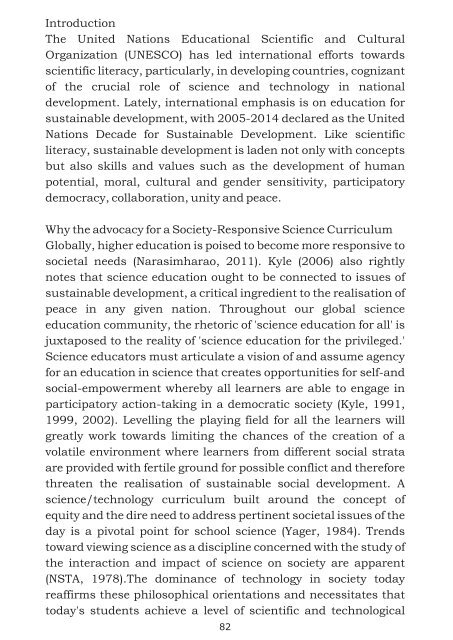Beneficiaries are actors too.pdf - Southern Institute of Peace ...
Beneficiaries are actors too.pdf - Southern Institute of Peace ...
Beneficiaries are actors too.pdf - Southern Institute of Peace ...
Create successful ePaper yourself
Turn your PDF publications into a flip-book with our unique Google optimized e-Paper software.
Introduction<br />
The United Nations Educational Scientific and Cultural<br />
Organization (UNESCO) has led international efforts towards<br />
scientific literacy, particularly, in developing countries, cognizant<br />
<strong>of</strong> the crucial role <strong>of</strong> science and technology in national<br />
development. Lately, international emphasis is on education for<br />
sustainable development, with 2005-2014 decl<strong>are</strong>d as the United<br />
Nations Decade for Sustainable Development. Like scientific<br />
literacy, sustainable development is laden not only with concepts<br />
but also skills and values such as the development <strong>of</strong> human<br />
potential, moral, cultural and gender sensitivity, participatory<br />
democracy, collaboration, unity and peace.<br />
Why the advocacy for a Society-Responsive Science Curriculum<br />
Globally, higher education is poised to become more responsive to<br />
societal needs (Narasimharao, 2011). Kyle (2006) also rightly<br />
notes that science education ought to be connected to issues <strong>of</strong><br />
sustainable development, a critical ingredient to the realisation <strong>of</strong><br />
peace in any given nation. Throughout our global science<br />
education community, the rhetoric <strong>of</strong> 'science education for all' is<br />
juxtaposed to the reality <strong>of</strong> 'science education for the privileged.'<br />
Science educators must articulate a vision <strong>of</strong> and assume agency<br />
for an education in science that creates opportunities for self-and<br />
social-empowerment whereby all learners <strong>are</strong> able to engage in<br />
participatory action-taking in a democratic society (Kyle, 1991,<br />
1999, 2002). Levelling the playing field for all the learners will<br />
greatly work towards limiting the chances <strong>of</strong> the creation <strong>of</strong> a<br />
volatile environment where learners from different social strata<br />
<strong>are</strong> provided with fertile ground for possible conflict and therefore<br />
threaten the realisation <strong>of</strong> sustainable social development. A<br />
science/technology curriculum built around the concept <strong>of</strong><br />
equity and the dire need to address pertinent societal issues <strong>of</strong> the<br />
day is a pivotal point for school science (Yager, 1984). Trends<br />
toward viewing science as a discipline concerned with the study <strong>of</strong><br />
the interaction and impact <strong>of</strong> science on society <strong>are</strong> app<strong>are</strong>nt<br />
(NSTA, 1978).The dominance <strong>of</strong> technology in society today<br />
reaffirms these philosophical orientations and necessitates that<br />
today's students achieve a level <strong>of</strong> scientific and technological<br />
82


